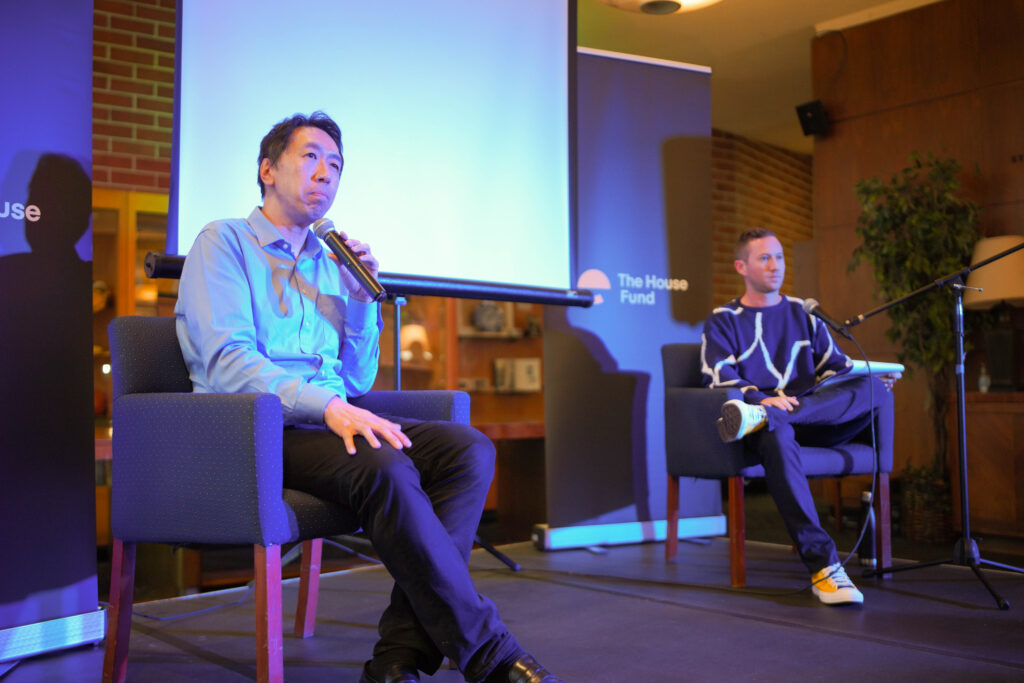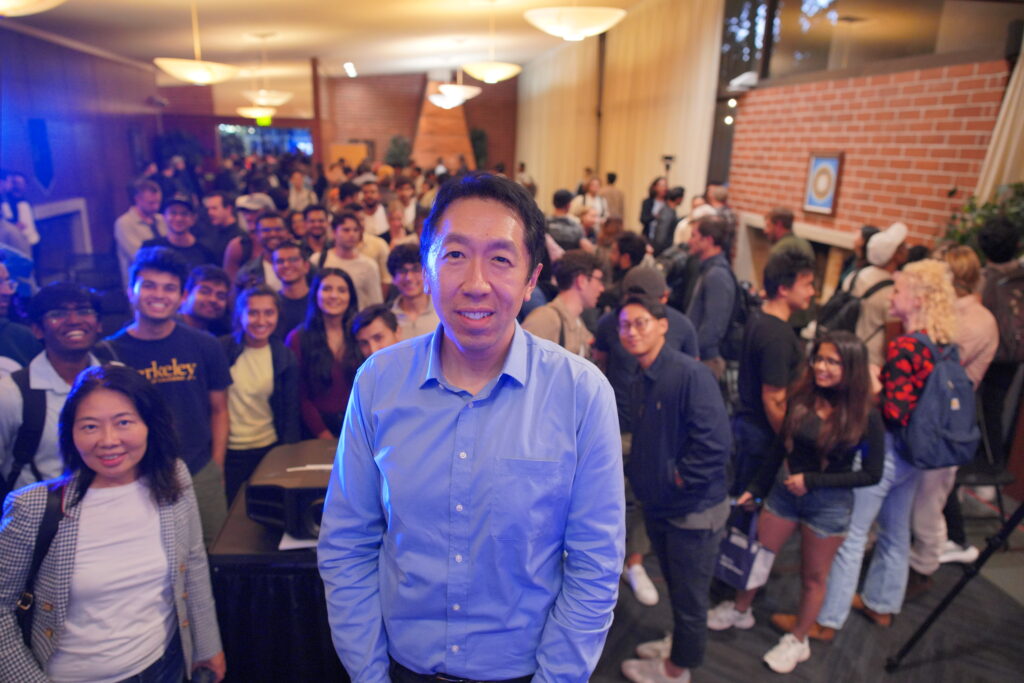“AI is the New Electricity”: Insights from Dr. Andrew Ng

AI luminary Andrew Ng recently shared his insights on the future of AI at a Berkeley event titled “How AI Will Change the World (for Good)” hosted by The House Fund with support from the Sutardja Center for Entrepreneurship & Technology (SCET). Ng, one of the world’s most respected AI experts, emphasized the transformative potential of AI, highlighting its vast opportunities for the audience of nearly 300 Berkeley student entrepreneurs.
Two Tools Ushering in AI’s Golden Age

Dr. Ng highlighted that the modern AI era stands firmly on the shoulders of two indispensable tools: supervised learning and generative AI.
Supervised learning’s prowess lies in its ability to ‘label.’ This tool transcends domains: from predicting ad clicks—vital for giants like Google—to advanced medical diagnostics and even spam detection. Its widespread applicability has entrenched supervised learning as today’s AI workhorse.
On the other hand, generative AI—though nascent and still relatively small compared to the current supervised learning—holds untapped potential. As Dr. Ng envisions it, while supervised learning may double its influence in the coming three years, generative AI’s impact could grow much more quickly.
Unleashing AI’s Vast Potential: The Customization Challenge

For a moment, visualize all possible AI projects, ranked by their potential value. On one end, you have gargantuan projects like online advertising that cater to billions and rake in massive revenues. But here’s the catch: such projects require significant resources. Typically, they’ve been the realm of tech titans, demanding armies of engineers to execute.
Dr. Ng introduced the audience to a fascinating paradigm shift. Moving away from these behemoths, he spotlighted smaller projects—each potentially worth about $5 million. Examples included ensuring even cheese distribution on pizzas or optimizing wheat harvests with AI cameras. Such projects, once deemed financially unviable due to resource constraints, now lie within reach.
Most industries, Dr. Ng pointed out, are riddled with these $5 million opportunities. But there’s been a gap: the absence of an efficient way to execute them. Enter low-code platforms. These tools empower even smaller teams to customize AI solutions tailored to specific needs, leveraging their unique data. The rise of such tools signals a promising democratization of AI, allowing its benefits to permeate industries beyond just tech.
Navigating the AI Stack: A Glimpse into Opportunities

Dr. Ng provided a comprehensive overview of the AI stack and the myriad opportunities it offers:
- Hardware Layer: Though pivotal, this realm is capital-intensive, with only a few players dominating. The barriers to entry are high, and therefore, it might not be the most accessible avenue for new entrants.
- Cloud Infrastructure: Similar to hardware, this layer is equally capital-intensive and concentrated. New entrants might find it challenging to break into this space, despite its undeniable potential.
- Developer Tooling Layer: This layer is a veritable battleground, brimming with competition. Startups might find success here, but only with a significant technological edge. Established entities benefit from distribution advantages, but startups need that technological edge to carve a niche.
- Application Layer: Surprisingly, this layer, which should technically be thriving given its foundational role in supporting the infrastructural and tooling layers, appears to be rife with opportunity and relatively less competition. Dr. Ng cited an intriguing example of applying AI in the realm of romantic relationship coaching—a collaboration between AI experts and the former CEO of Tinder, resulting in a unique relationship mentorship platform. This underscores the vast potential and diversity of AI applications awaiting exploration.
Crafting a Startup: The Ng Formula

Dr. Ng unveiled his systematic methodology for forming new startups:
- Idea Validation: Any idea brought to the table undergoes rigorous scrutiny. Through a month-long process, the feasibility—both market and technical—is ascertained. This isn’t about broad, nebulous domains like “AI in financial services,” but specific, actionable concepts, which can be effectively validated or dismissed.
- Founder Recruitment: Once the idea survives the initial validation, the search for a Founder-in-Residence or CEO begins. This individual, ideally with a blend of industry knowledge and entrepreneurial spirit, helps shape the venture further.
- Prototype & Feedback: A three-month phase follows where the core idea transforms into a technical prototype. This isn’t just about technology—it’s also about understanding market needs, gathering feedback, and refining the concept.
- Pre-Seed Growth: If the prototype shows promise, it moves into a year-long phase of refinement. Here, executive teams are formed, MVPs built, and the first set of customers are onboarded.
- Transition to Seed/Scale Phase: Once the MVP garners traction, it positions the startup to secure the next round of funding.
Dr. Ng’s emphasis was clear: While AI presents myriad opportunities across sectors, what’s essential is the marrying of AI expertise with domain-specific knowledge. One needs a concrete idea, not just a general domain, to make a meaningful impact.
Championing Ethical AI: Responsibility Over Revenue
Dr. Ng stressed that with the immense potential of AI comes a profound responsibility. AI’s capabilities are growing exponentially, but it’s vital to ensure these tools serve humanity positively.
At AI Fund, this commitment to ethics isn’t just a tagline—it’s a deeply entrenched philosophy. Every project undergoes ethical evaluation, and ventures that may harm societal values, irrespective of their commercial potential, are promptly discontinued. In Dr. Ng’s words, they “only work on projects that move humanity forward.” Such a stance ensures that as the AI community continues to evolve and make strides, it does so with the betterment of society at its core.
Berkeley’s Legacy in Nurturing AI Visionaries
Highlighting Berkeley’s monumental role in molding entrepreneurs, Jeremy Fiance recounted the transformative experience SCET offers to its students. Alumni, such as the founder of DoorDash, are a testament to SCET’s far-reaching influence in the entrepreneurial world.
“Many great [Berkeley] alumni entrepreneurs have taken [SCET] classes to learn about entrepreneurship and went on to start huge impactful companies in the world, so if I were you if if I was a student in this room after this I’d go sign up for one of these classes as fast as humanly possible,” said Fiance about the impact he has seen with students taking SCET courses.

